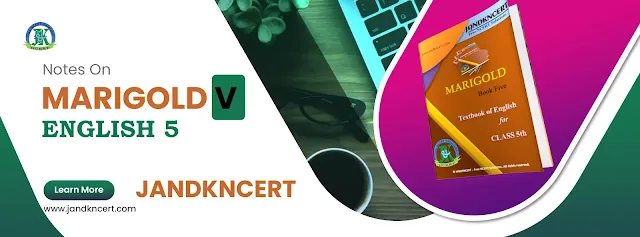JANDKNCERT - Free NCERT Solutions
English | Marigold Book V
If you are seeking NCERT solutions,
you've come to the right place. JANDKNCERT offers free solutions for a variety
of NCERT books, including the recently introduced 'Marigold' English version
for Class 5 students in JK UT. Explore our library at www.jandkncert.com
for valuable study materials and simplified solutions to the lessons/chapters
in this book. To view the Tulip Series of class 5th English visit https://www.jandkncert.com/p/free-ncert-solutions-for-class-5th.html
In this post, you will find the summary, questions
and answers to the lesson ‘Robinson Crusoe
Discovers a Footprint’, taken from the recently introduced English for JK UT students, Marigold
Book V. Read the lesson from the Textbook of English Marigold Book V of JK
or download the same series from the ncert website.
Unit
3
Summary | Questions | Answers |
Lesson
3. Robinson Crusoe Discovers a Footprint (Daniel Defoe)
New Words
savages:
wild people in primitive state
mainland:
the large continuous extent of land
wandered:
go from place to place without a definite route
bolder:
more confident
inhabited:
occupied, dwelled in
Short Summary
In
"Robinson Crusoe Discovers a Footprint" by Daniel Defoe, the
protagonist Robinson Crusoe, marooned on a deserted island, experiences a
profound moment of realization. As he explores the island, Crusoe stumbles upon
a footprint in the sand, indicating the presence of another human being. Shocked
and filled with fear, Crusoe grapples with the realization that he may not be
alone on the island.
This discovery triggers a range of emotions in Crusoe, from anxiety to excitement. It marks a significant turning point in the story as it shatters the isolation he has endured since being shipwrecked. The footprint becomes a symbol of hope and the possibility of human companionship, bringing both fear and anticipation to Crusoe's solitary existence. The event foreshadows future developments in the narrative as Crusoe's interactions with the island take on a new dimension with the prospect of encountering other survivors.
Let’s Read
Question
1. What made Robinson Crusoe think that the print on the ground was a
footprint?
Answer:
The
exact print of toes, heel and every part of a foot made Robinson Crusoe think
that the print on the ground was a footprint.
Question
2. Why was Robinson afraid when he looked at the bushes and trees?
Answer:
When
Robinson looked behind after every two or three steps at the bushes and trees,
he was afraid because he was already frightened by the invisible footprints. The
presence of the footprint suggests the possibility of other human beings or,
potentially, hostile inhabitants on the island.
Question
3. Why did Robinson pray when he saw the footprint?
Answer:
Robinson
prayed for his comfort and protection because he was feared that savages would
come and kill him if they confirmed his presence there.
Question
4. Choose the correct answer.
(i)
Robinson ran back to his home, as fast as he could because he
(a)
was racing.
(b)
was afraid.
(c)
was in a hurry to go home.
Answer:
(b)
was afraid.
(ii)
He could not sleep because
(a)
there was an animal outside his cave.
(b)
he thought savages had come from the mainland.
(c)
his bed was uncomfortable.
Answer:
(b)
he thought savages had come from the mainland.
(iii)
Why was Robinson Crusoe sure that it was not his footprint?
(a)
It didn't look like a human footprint.
(b)
It looked smaller than his.
(c)
He had not come to this part of the beach in a long time.
Answer:
(c) He had not come to this part of the beach in a long time.
(iv)
Where was Robinson Crusoe?
(a)
On a boat.
(b)
In a town.
(c)
Alone on an island.
(d)
On an aeroplane.
Answer:
(c) Alone on an island.
Let’s Write
1.
The words in the sentences are jumbled. Write them in order. One is done for
you.
(i)
Alone was not Robinson an island on
Answer: Robinson was not alone on an island.
(ii)
was the island inhabited
Answer:
The
island was inhabited.
(iii)
footprint to someone this belonged
Answer:
This footprint belonged to someone.
(iv)
I around me looked
Answer:
I looked around me.
(v)
I went the towards footprint large
Answer:
I went towards the large footprints.
(vi)
was afraid I now
Answer:
I was afraid now.
2.
Fill in the blanks with the correct word.
And, but, because, so
(i)
I was frightened _______ curious.
(ii)
I decided to go to the beach _______ I went along the water's edge.
(iii)
I ran as fast as I could _______ I was frightened.
(iv)
I was very tired _______ confused.
Answer:
(i)
I was frightened and curious.
(ii)
I decided to go to the beach so I went along the water's edge.
(iii)
I ran as fast as I could because I was frightened.
(iv)
I was very tired but confused.
3.
Write a story on strange footprints.
Where
did you see the footprints?
What
sort of a day was it?
Did
you see them at night?
What
happened when you followed the footprints?
What
did you see?
What
happened then?
Answer:
In Crestwood, I discovered mysterious footprints in
the park on a sunny day. Intrigued, I followed them into the woods as night
fell. The glowing footprints led me to a magical clearing with a peculiar tree.
Woodland creatures, leaving the footprints, danced in the moonlight.
Mesmerized, I watched their enchanting celebration unfold. As dawn approached,
the footprints faded, and I found myself back in the park. The magical memory
of the strange footprints and woodland celebration lingered, turning an ordinary
day into an extraordinary tale of wonder and magic.
(Same Story in Another
Version)
Title: The Mystery of
the Strange Footprints
Once upon a time, in
the small town of Crestwood, I stumbled upon a mysterious set of footprints
that would change the course of an ordinary day into an extraordinary
adventure.
I first noticed the
footprints in the park near my house. It was a sunny afternoon, and the park
was bustling with families enjoying their weekend picnics. As I strolled along
the path, I noticed a peculiar set of footprints that seemed out of place. They
were large, with an intricate pattern that resembled nothing I had ever seen
before.
Curiosity got the
better of me, and I decided to follow the strange footprints. The day, which
started so ordinary, now took a turn into the unexpected. The footprints led me
through the park, across a meadow, and into the dense woods that bordered the town.
As I followed the
footprints, the sun began to set, casting long shadows through the trees. It
was now getting darker, but my determination to solve the mystery propelled me
forward. The footprints seemed to glow faintly in the moonlight, guiding me
deeper into the woods.
Suddenly, I stumbled
upon a clearing where the footprints abruptly ended. In the middle of the
clearing stood a peculiar-looking tree, unlike any other in the woods. Its
branches twisted and turned, forming a canopy that seemed to dance in the night
breeze.
To my amazement, the
strange footprints had led me to a magical gathering of woodland creatures.
Squirrels, rabbits, and even fireflies were engaged in a whimsical dance around
the mystical tree. The footprints, as it turned out, were left by the creatures
as they celebrated under the moonlit sky.
Mesmerized by the
enchanting scene, I quietly observed the magical festivities. The woodland
creatures, unaware of my presence, continued their dance, weaving a tapestry of
light and shadows.
As the night unfolded,
the creatures gradually dispersed, leaving me alone with the peculiar tree. To
my surprise, the tree spoke, thanking me for joining their celebration. It
explained that the footprints were a path to an enchanted realm that only opened
during the rare alignment of celestial events.
With a sense of wonder,
I retraced my steps, the strange footprints now fading away as dawn approached.
As the sun rose, I found myself back in the familiar park, but the magical
memory of the strange footprints and the enchanted woodland celebration would
forever linger in my heart, turning an ordinary day into an extraordinary tale
of wonder and magic.
4.
Use the joining words given below and join the sentences in Column and.
or, and, so, but, because
|
A |
B |
|
(i)
I can sing well. (ii)
She wore a raincoat. (iii)
We may go to Shimla. (iv)
He wanted a book for his birthday. (v)
He missed the school bus. (vi)
I wrote the letter. |
I
forgot to post it. It
was raining. He
was late to school. We
may go to Darjeeling. He
wanted a football for his birthday. I
can’t dance at all |
eg:
I wrote the letter but I forgot to post it.
Answer:
(i)
I can sing well but I can’t dance at all.
(ii)
She wore a raincoat because it was raining.
(iii)
We may go to Shimla or we may go to Darjeeling.
(iv)
He wanted a book for his birthday and he want a football for his birthday.
(v)
He missed the school bus so he was late to school.






.webp)




Leave your comment here.